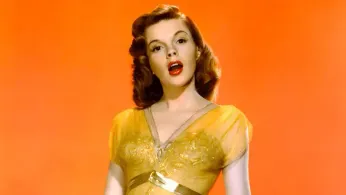
Aug 5
“Judy Garland: The Voice of MGM” Shines a Spotlight on a Queer Icon’s Hollywood Legacy
READ TIME: 3 MIN.
Judy Garland’s legacy as one of Hollywood’s most enduring icons receives fresh and meticulous attention in “Judy Garland: The Voice of MGM,” the new book by acclaimed film historian Scott Brogan. Published by Lyons Press and spanning over 400 pages, Brogan’s volume stands as the first comprehensive work dedicated solely to Garland’s prolific years at Metro-Goldwyn-Mayer Studios, a period that defined both her career and the golden age of American musicals .
While Garland has long been the subject of biographies and documentaries, Brogan’s approach departs from the familiar focus on her personal struggles, instead highlighting her artistic achievements, humor, and the cultural context that made her an enduring icon for LGBTQ+ people . The book delves into her filmography with MGM, her groundbreaking radio appearances, her association with Decca Records, and her celebrated USO Bond Tours during World War II, offering readers a nuanced portrait of Garland as both performer and person .
Garland’s appeal has always transcended the screen. For generations of LGBTQ+ people, she has symbolized resilience in the face of adversity and the transformative power of performance. Brogan’s book underscores this connection by reframing her MGM years as a testament to her creative brilliance and the barriers she broke as the studio’s preeminent star—a title she earned after joining MGM at just 13 and departing in 1950 as “Metro’s Greatest Asset” .
Brogan’s research surfaces previously unpublished details that will resonate with Garland’s devoted LGBTQ+ following, who have long found inspiration in her perseverance and her unique ability to create community through music and storytelling. The book invites readers to appreciate Garland not only as a symbol of survival but as a groundbreaking artist whose influence continues to ripple through queer culture today .
Garland’s connection to the LGBTQ+ community is well documented, most famously marked by the coincidence of her death and the Stonewall uprising in June 1969. While Brogan’s book focuses on her MGM years rather than later cultural events, its release has reignited discussion about the ongoing significance of Garland’s legacy. Her songs, especially “Over the Rainbow,” still serve as anthems of hope and longing, themes that resonate deeply with queer audiences. Brogan’s careful curation of archival materials and his celebration of Garland’s humor and humanity contribute to a richer understanding of why she remains such a beloved figure .
The release has also prompted LGBTQ+ media and community organizations to revisit Garland’s impact. Discussions at recent Pride events and in queer film forums have highlighted Brogan’s work as essential reading for both long-time fans and newcomers to Garland’s story, emphasizing her role in shaping the aesthetics and politics of queer identity in the 20th century .
“Judy Garland: The Voice of MGM” is already being hailed as the definitive volume on the star’s MGM career, with critics praising its balance of scholarly rigor and narrative warmth . By pulling back the curtain on the intricacies of Garland’s professional life, Brogan allows readers to move beyond the myths and appreciate the complexity of a woman whose voice defined an era and whose spirit continues to inspire.
For LGBTQ+ readers, the book stands as a powerful reminder that queer history is inseparable from the stories of artists who dared to be different—both on and off the screen. Brogan’s work ensures that Garland’s contributions, and her special place in queer hearts, will be remembered for generations to come.






